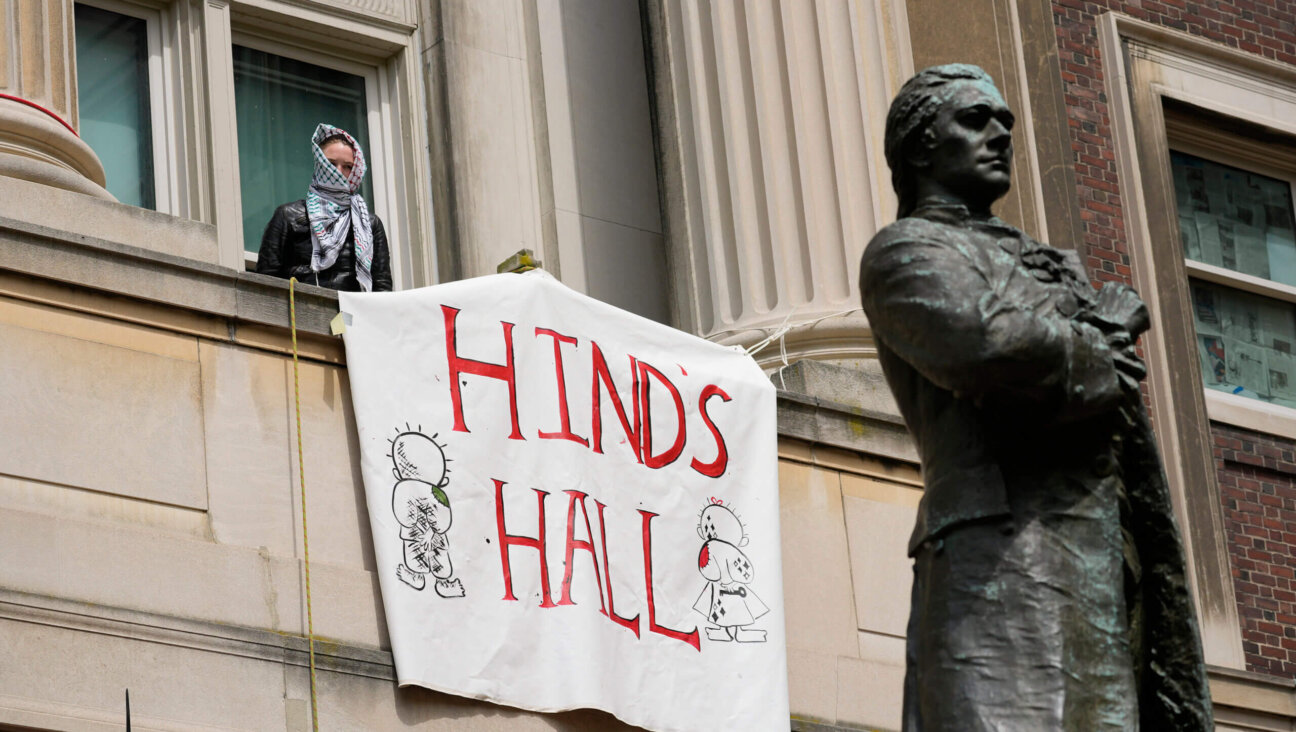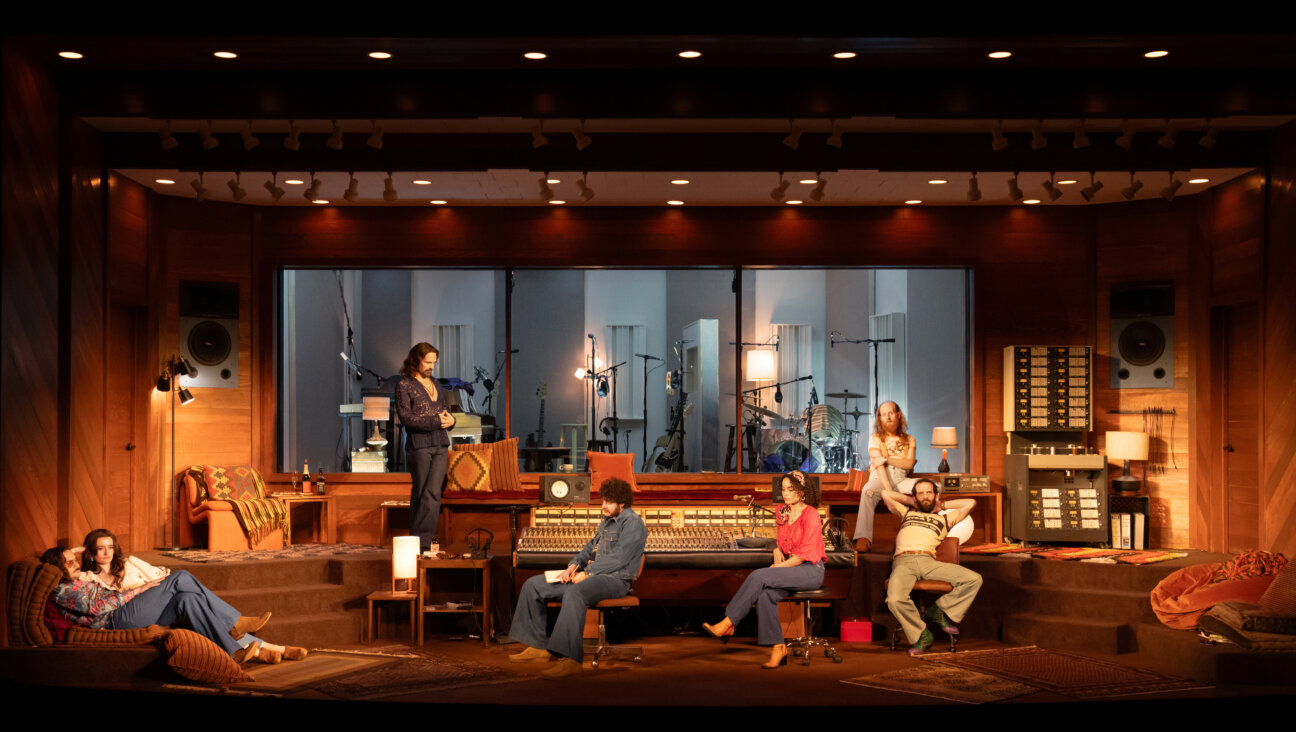How Rudy Giuliani Got ‘Klinghoffer’ Right

Anger Over Art: Ex-New York Mayor Rudy Giuliani denounces ‘The Death of Klinghoffer’ at a rally outside the opera’s debut at the Metropolitan Opera in New York. Image by Getty Images
Never thought I’d say this, but Rudy Giuliani got it right.
The former mayor of New York laid out a principled, informed stand against the controversial opera “The Death of Klinghoffer,” arguing that the murder of a disabled American Jew is presented in a way that glorifies and excuses terrorism. I don’t agree with Giuliani’s conclusion, but I admire the fact that he came to it after actually studying the piece.
He showed us how a protest should be waged.
Too many others who angrily attempted to drown out the music emanating from the Metropolitan Opera House on Monday night’s opening performance showed us just the opposite. Their language and tactics were offensive, embarrassing and, I hope, ultimately self-defeating.
I have not seen John Adams’s acclaimed opera, which debuted in 1991, nor have I listened to the music or read the libretto. Two of my colleagues at the Forward who have seen all or most of it believe that the show should go on, and I’m inclined to agree with their judgment. But without seeing the entire production, without hearing the offending phrases in context or experiencing the closing aria sung by the Marilyn Klinghoffer character or absorbing the feeling a work of great art demands, I simply am not qualified to comment on it.
That did not stop many of the angriest protesters from damning the production, its creators and its host, it seems. And that’s not even the worst of it.
Threats were sent to the Met’s leadership and performers. Alan Opie, the baritone who plays Leon Klinghoffer, told the New York Times that his agent received emails likening him to the murderers.
He is an opera singer. Not a terrorist.
Abraham Foxman told the Times that, after brokering an earlier compromise with the Met not to broadcast the opera worldwide, he received an email calling him a “kapo.”
He’s the national director of the Anti-Defamation League, for goodness sakes, not a Jewish apologist for the Nazis.
Jeffrey S. Weisenfeld, master of ceremonies of Monday’s protests, promised earlier to return every night the opera is staged “until the set is burned to the ground.”
Is this how Jews lodge a complaint? By bullying artists, defaming our own leaders and hoping a piece of art will be destroyed?
Instead, there was Giuliani’s approach. He acknowledged the complexity of the issue, especially as an opera fan who actually owns a CD of “Klinghoffer,” has read the libretto multiple times and thinks Adams is one of America’s greatest composers.
And he acknowledged the free speech implications at risk here. “The Met has the First Amendment right to present this opera, and people certainly have a similar right to attend. It is their choice,” he wrote in The Daily Beast. “Equally, all of us have as strong a First Amendment right to make our position clear…” And he did.
I should say that plenty of Jewish leaders protested the opera in a similarly civil fashion. Scores of them signed a letter organized by the Jewish Community Relations Council of New York that explained why they were “deeply disturbed” by the production. It stopped short of demanding its cancellation, but its message was unmistakable.
Good people can and, indeed, should disagree on an issue as fraught and complex as this. When does the freedom to offend leach into incitement? By humanizing terrorists, do we make their crimes more acceptable? Should we judge a massive piece of art by a few lines, or its overall affect? Should any chapter in history be placed off-limits to artistic interpretation?
How I wish the opening of “The Death of Klinghoffer” had been accompanied by a discussion of such questions. But instead, the voices of serious, civil protest were drowned out by the bullies. It takes a lot more confidence to strongly object to this opera but still remain committed, as Giuliani is, to the Met as a great institution. Far more confidence, in fact, than threatening to burn it down.

I hope you appreciated this article. Before you go, I’d like to ask you to please support the Forward’s award-winning journalism this Passover.
In this age of misinformation, our work is needed like never before. We report on the news that matters most to American Jews, driven by truth, not ideology.
At a time when newsrooms are closing or cutting back, the Forward has removed its paywall. That means for the first time in our 126-year history, Forward journalism is free to everyone, everywhere. With an ongoing war, rising antisemitism, and a flood of disinformation that may affect the upcoming election, we believe that free and open access to Jewish journalism is imperative.
Readers like you make it all possible. Today is the last day of our Passover Pledge Drive and we still need you to step up and make a gift to sustain our trustworthy, independent journalism.
Make a gift of any size and become a Forward member today. You’ll support our mission to tell the American Jewish story fully and fairly.
— Rachel Fishman Feddersen, Publisher and CEO
Join our mission to tell the Jewish story fully and fairly.
Today is the last day to contribute.























